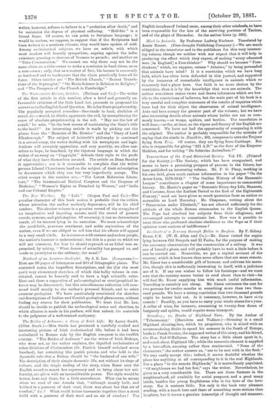Mind in Animals. By Professor Ludwig Buchner. Translated by Annie
Besant. (Free-thought Publishing Company.)—We are mach obliged to the translator and to the publishers for this very interest- ing volume, though we neither wish nor expect that it will help in producing the effect which they expect, of making "every educated man [in England] a Free-thinker." Why should we become "Free- thinkers," which, we suppose, means "Atheists," by being persuaded that animals have mind ? It is a conviction which we have long held, which has often been defended in this journal, and supported by the instances of remarkable intelligence in animals which se commonly find a place here. Our faith is no more shaken by the conviction, than it is by the knowledge that men are animals. The author sometimes states views and draws inferences which are hos- tile to the convictions of believers, but the main part of his book is a very careful and complete statement of the results of inquiries which have had for their object the observation of animal intelligence.. Ants and bees occupy the greater part of the volume; but we have also interesting details about animals whose habits are not so com- monly known,—as wasps, spiders, and beetles. The translation is well done,—as far, at least, as the vigour and fluency of the English are concerned. We have not had the opportunity of comparing it with- the original. The author is probably responsible for the mistake of saying that the simile in lEneid iv., 402, compares to ants the Trojans flying from Troy. Of course, they are flying from Carthage. But who is responsible for giving "221 A.D." as the date of the Emperor Hadrian, and for writing "Be Solertiae Animalium ?"


































 Previous page
Previous page